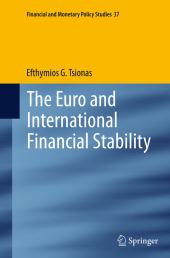 Neuerscheinungen 2016Stand: 2020-02-01 |
Schnellsuche
ISBN/Stichwort/Autor
|
Herderstra▀e 10
10625 Berlin
Tel.: 030 315 714 16
Fax 030 315 714 14
info@buchspektrum.de |

Efthiomios Tsionas
The Euro and International Financial Stability
Softcover reprint of the original 1st ed. 2014. 2016. ix, 308 S. 5 SW-Abb. 235 mm
Verlag/Jahr: SPRINGER, BERLIN; SPRINGER INTERNATIONAL PUBLISHING 2016
ISBN: 3-319-37766-3 (3319377663)
Neue ISBN: 978-3-319-37766-7 (9783319377667)
Preis und Lieferzeit: Bitte klicken
This book presents an analysis of international financial stability in the context of Austrian economics. It provides an examination of the future of the Euro and the European Union.
As a result of the financial crisis, the weaknesses of the Eurozone, including the public debt crisis, materialized in severe depressions in certain of its country members. In this monograph, the author analyzes structural weaknesses of the Eurozone and argues that they can be traced to (i) institutional differences, (ii) differences in the economic structures, (iii) the fundamental inability of European Bureaucracy to deal with crises, and (iv) the extreme rigidity of markets which prevents a general equilibrium in product and credit markets. He concludes that whether the Eurozone is sustainable, depends on future monetary and credit policies, and discusses the implications of reforming it in the best interest of the international banking and financial system. The recent policies of the ECB of "cheap" credit expansion are examined in detail. The approach of the work is along the lines of von Mises┤ and Hayek┤s Austrian tradition; additionally, substantive international empirical evidence supporting this Austrian approach is presented.
1 Introduction.- 2 What Went Wrong With the Euro?.- 3 Public Debt: Introductory Remarks.- 4 Was the Eurozone an Acceptable Currency Union?.- 5 Preconditions of a Monetary Union.- 6 What Was the Theory Behind the Formation of EMU?.- 7 Will the Eurozone Dissolve Into Its Constituents?.- 8 Can There Be an Efficient Dissolution of a Monetary Union?.- 9 Complete Fiscal Freedom in the Transition Period?.- 10 Understanding Crises and Recessions.- 11 Will Bailouts Lead to a Dissolution of the Euro?.- 12 On the Destabilizing Effects of Bailouts.- 13 On Sound Money and Credit Conditions.- 14 The Case of Free Banking.- 15 The Explosion of Public Debts.- 16 The Current Policies of the ECB.- 17 Some Remarks on the Greek Problem.- 18 Can There Be Stable Currencies After the Euro?.- 19 The Gold Standard and Free Banking.- 20 An Unexpected Supporter of the Gold Standard.- 21 Fundamental Problems of the Eurozone.- 22 Stability and the Eurozone.- 23 Conditions for Genuine Financial and Monetary Stability.- 24 International Financial Stability.- 25 On Monetary Policies.- 26 A New Fiscal Policy?.- 27 The "Price Puzzle".- 28 Re-Distributional Effects of Austerity Measures.- 29 Further Remarks on International Financial Stability.- 30 The Accommodation of Public Debt by Commercial Banks.- 31 The Consequence of the Market┤s Responses.- 32 Is Eurozone Effectively a Socialist Commonwealth?.- 33 Banking Efficiency.- 34 Banking and Regulation.- 35 Policy and Institutional Change in Southern Europe.- 36 Was the Euro a Bad or a Good Idea?.- 37 The Role of the Rate of Profit.- 38 International Industrial Structure.- 39 Capital Structure and Financial Stability.- 40 International Empirical Evidence on the ABC┤s of Recessions.


